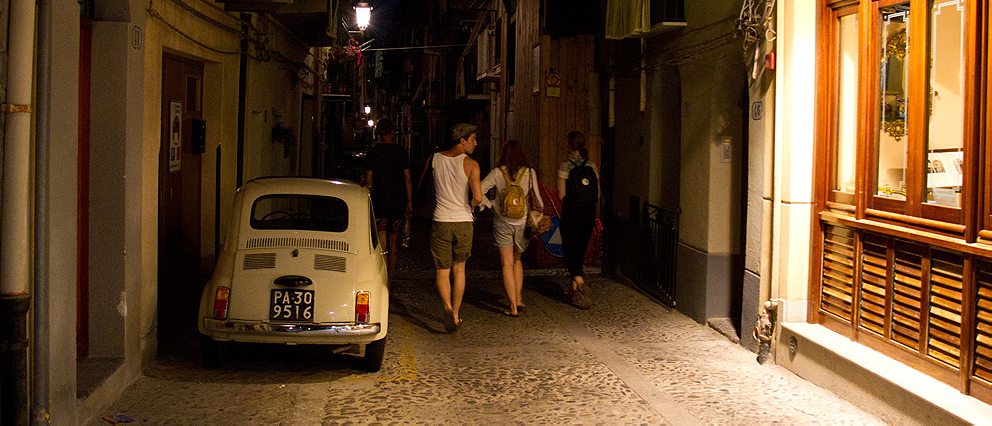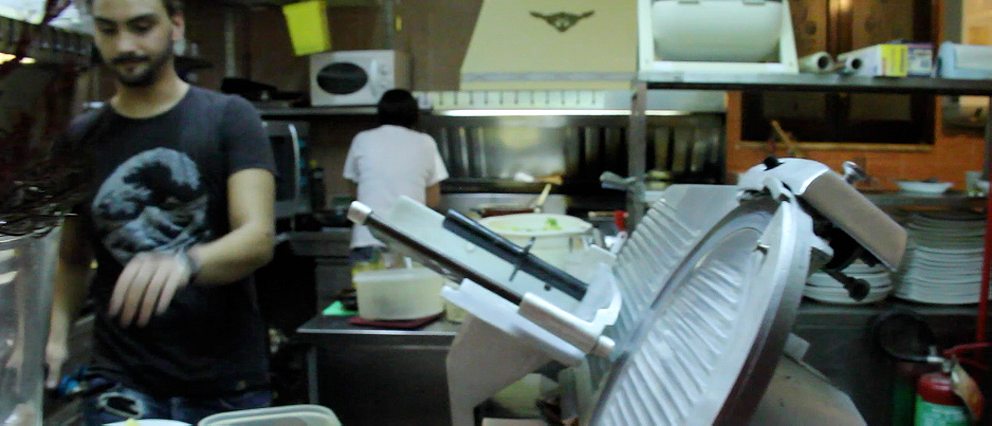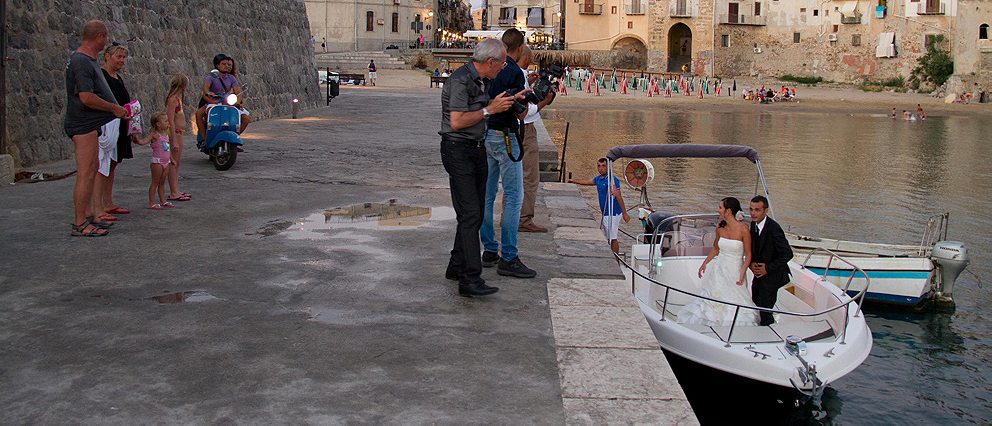A day in jetty-jumping, family-fighting, German-jostling, pasta-pounding Cefalú
Scene 1: Beach Buffet
It bodes well for your grumbling stomach: a pizzeria with a shady terrace, a sprawling antipasti bar, a generous view of the bustling beach scene below.
But as you work your way down the coast, inspecting the other options—you know, because it’s nice to have options when you’re this hungry—the same scene unfolds from one restaurant to the next: pizzeria, antipasti bar, dishes in six languages, as if local restaurateurs got a wholesale break on German menus and checkered tablecloths.
You look closer, try to get a sense of what’s coming out of the kitchen. These are not the wood-perfumed, pockmarked pies of your Italian fantasies; the crust is flabby, the cheese more yellow than white, the tomatoes have nothing to do with the brilliant red ones grown just minutes inland. The sea of flesh below is more thoroughly baked than what is coming out of these ovens, but still, your hunger rages on.
You want cooks cooking what they want to eat, not what they think you want to eat. But in towns like Cefalú, where people have traveled long distances to turn their skin all shades of pink and orange and mahogany, you’ll have to move well beyond the Mediterranean to find real food. And that’s not easy with that blue-green water beckoning.
Down the street someone is selling melons the size of basketballs; they smell like orchids. Next door you find a store selling hard Sicilian cheeses and cold bottles of wine. Buy it all, plus a few of those Baci, too, and take it down to the beach to bathe in the madness of an Italian summer. It’s the best table in town.

Scene 2: The German Connection
You might have heard a little something about a north-south divide in Europe. Like many family spats, it’s about money. The southerners, of which the Sicilians are the most southerly, tend to see the Germans in particular as some sort of dread mix of Visigoth and banker, looking to take over Italy once again, this time with austerity measures and central bank stress tests. The northerners, on the other hand, see the southerners, not without reason, as being wasteful borrowers who seem to lack the slightest idea of where money comes from and how it should be spent.
All the more impressive, then, to see the relatively harmonious coluxuriation of north and south on the beaches of Cefalú. You see them strolling the same streets at night, same ice cream in hand, part of the same clusterfuggio di turisti. Sure, one’s a little more sun-burnt, one’s a little less. But they are all vacationers, men united by a single mission to wear the smallest possible speedo for the longest possible time on the beach.
And yet, you sense something a little unfair about this dynamic. You know that the Germans still hold the cards. They have the exports, they have the money, and they have the deep-seated belief that it’s not just what the southerners do, but it’s who they are, that is killing the European Union. So why, then, are the Germans (and the Dutch and the Swiss, all in large quantity) even here in Sicily? If they come and enjoy the slowness of the town and the air here, use Sicily as a therapy session for all their northern anxieties, do they then go back home and return to mocking the south and its poor work ethic? You hope, as you watch these groups mill about in the cathedral square, that along with their sunburns, the Germans will bring a little perspective back to Berlin with them.

Scene 3: The Mother-Son Shootout
“Tavola nove!” The call comes out from the kitchen. An older woman, maybe 65, is by herself back there and a round of pasta is ready. In Italy, pasta waits for no one.
“Tavola nove!” The second time it rises up from her gut—more of a warning than announcement.
Finally, she puts down her knife and grabs the plates of tagliatelle with porcini and the spaghetti with gorgonzola and walks them out to table nine herself.
On the way back to the kitchen of this restaurant, La Brace in the old town of Cefalú, she hisses at the only waiter, who also happens to be her son. He bites back and she flips him the back of her hand as she gets back to chopping zucchini.
You start to do the math. Twenty-seven diners, three plates a piece, one cook, one server: we’re fucked. It’s almost 11pm, the restaurant should have been empty, you think, but this is southern Italy and people have been on the beach until the Mediterranean swallowed the sun, so when you walk in, you see a room full of bronzed faces with wild looks in their eyes.
You sense the impending doom, as if the bile exchanged between mother and son will seep into the food and the wine and leave you with a viscous hangover. You think about slipping out undetected, but just then the son comes and you rattle of an order.
You pour yourself some wine—about a euro a glass, here in one of Sicily’s most expensive towns—and by the time the food starts to arrive 30 minutes later, you’ve remembered exactly where you are and it all starts to make sense. The pasta tastes as it does only in this country, with the sauce clinging so tight to the rigatoni that it looks like it was painted on the noodle. Rabbit slides off the bone and into a puddle or balsamic vinegar and chestnuts.
When you finally get the bill, well past midnight, after an espresso, a tiramisu and a cigarette, the son looks like he survived a fierce summer storm.
“When we work here, we’re not mother and son,” he says. But why not hire someone else to help out? “We prefer it this way.”

Scene 4: The Jetty Wedding
The jetty reaches out like a stone claw into the Mediterranean. You see the stone and respect it immediately: it’s part rampart, which is fitting for a town whose centerpiece cathedral is built with heavy turrets connected by covered walkways so that archers, not priests, can move safely between the two.
The water, however, you fall in love with up close. Peer over the jetty, and three feet below you is twenty more feet of water that is now impossibly blue and clear to the bottom. The kids and adults of the town have been flinging themselves off this jetty from sunup to sundown, disappearing under the water with a blue-white splash, and you want to join.
So you take off your shirt, place your sandals to the side, and jump. The first impressions upon contact: salt and cool. You are used to swimming in oceans, not a sea like the Mediterranean, and it’s shocking how salty the waters are. After that first jump, your sinuses start to clear: the Mediterranean is a giant neti pot. But then the cool hits you, and it is more than welcome, because you have been baking like baccalao in the Cefalú sun. The best part is how the water on the surface is a bit cooler than the water below, so each armstroke as you swim back to the pier is a new kind of refreshing. Between the salt that buoys your body and the coolness that pushes you forward, it’s the easiest twenty meter swim you’ve ever had.
Towel off a bit and then you notice a wedding couple that had been taking pictures on the rampart has descended to the jetty. They are a striking couple, not just young and beautiful—though they are that—but also serious. Trailed by two photographers and a videographer, they walk stone-faced toward a waiting boat. You will, because you have only ever known Sicily from the movies, be instantly reminded of Simonetta Stefanelli, who played the stoic bride Apollonia, unsmiling as she married Michael Corleone.
They descend into the boat. The groom begins talking urgently into a cell phone. They both look anxious, but that is also part of being young, and of getting married. But you don’t have time to think about this too much: with their boat now out of the way, you measure the jetty, get a running start, and fling yourself over once again.